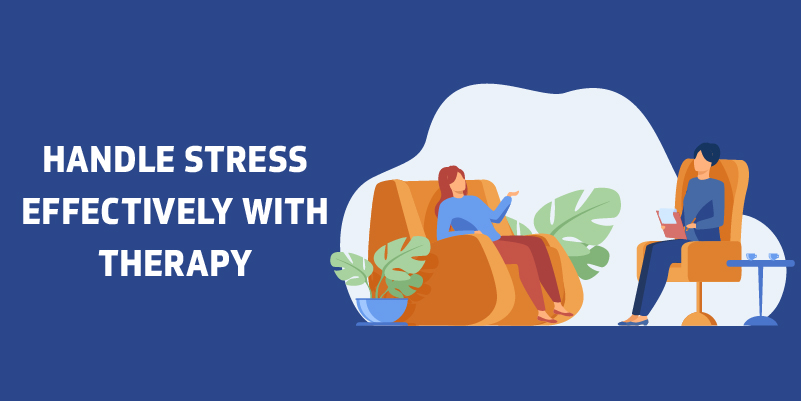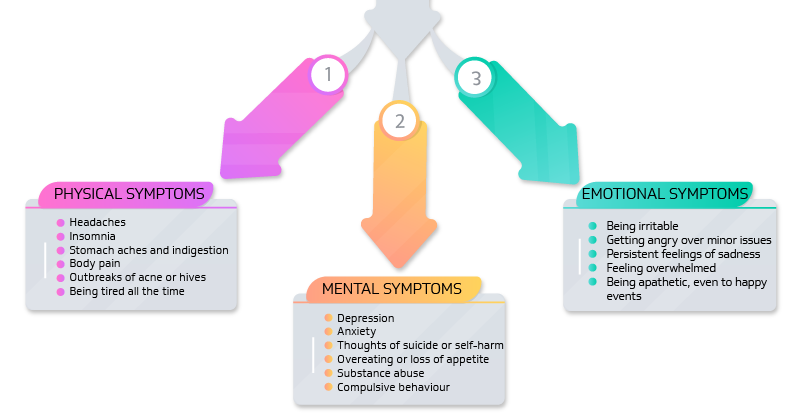
Stress is a normal reaction to external pressures. It’s not always caused by negative thoughts or events – even positive life experiences, like welcoming a new baby or starting a new job, can be stressful. Stress affects our bodies, our thoughts and our feelings. When we are stressed, we become alert and motivated to act. This is great in short bursts – if you have an important exam coming up, stress can enable you to work harder and improve your concentration. But trying to cope with stress long-term is hazardous to our wellbeing.
The body’s response to stress is instinctive and uncontrollable: more blood flow, faster heart rate, increased blood pressure and higher blood sugar levels. People who are stressed for a long time can develop hypertension, diabetes or chronic pain, among many others, or even have a stroke or a heart attack.
Chronically high stress levels have also been linked to numerous mental health issues, including insomnia, anger issues, depression, anxiety, substance use, and problems with intimacy and social interaction. For some people, these issues disappear on their own once the source of stress is resolved, but many others can only learn to cope with stress with help from a physician or a mental health professional.
It’s quite difficult to find someone who has never experienced stress, and each one of us reacts differently. People who are under stress may show physical, mental and emotional symptoms, or some combination of these. Here are some of the visible symptoms to watch out for:

It’s okay to reach out for help if you find yourself struggling to deal with the stressful situations in your life. You can learn how to manage stress in a healthy and safe way by talking with a therapist you trust. Through therapy, you can identify the unhealthy coping strategies you are using to handle stress and develop healthy ones instead. There are many healthy ways to cope with stress that can bring relief both in the short- and long-term.
Talking to a therapist about your stress is key to addressing it and finding long-term ways to reduce its impact. Your therapist can recommend personalised, healthy strategies that improve your overall wellbeing in the long run. He or she can help you understand and come to terms with life events that may have triggered your stress response, like personal loss, workplace issues, family or relationship problems, or life-changing medical diagnoses.
Therapy is not only for you to talk through your issues. Therapists and counsellors use several types of treatment to help you build the skills to cope with stress throughout their lives. For example, cognitive behaviour therapy helps you change the negative thought patterns that develop out of stress and find new ways of thinking that reduce its impact. Other types of therapy use mindfulness or creative pursuits like art and music to help you find a way of handling stress and finding a healthy, safe outlet for your thoughts and feelings.
Stress can also be the result of an existing mental health condition like anxiety or addiction, and these conditions are themselves treatable with therapy. Working with a therapist, you can understand your mental health and develop the best approach to build your resilience and achieve inner peace.
It’s never too early to reach out to a trusted therapist or counsellor. Especially in these times, stress is near-universal and it’s natural to feel overwhelmed and helpless by the deluge of bad news. If you observe any visible symptoms, don’t wait for them to get worse before seeking help. Get in touch to start your journey back to wellness.

Ms Trisha Ray
Consultant Psychologist & Special Educator
MA, Clinical Psychology | BEd, Special Education | CBT Certification, Beck USA | RCI Registered
Trisha is highly skilled in Psychological Consultation, Assessment (for ages 17 and under) and Psychotherapy for children, adolescents and adults.
She is available for consultation at RxDx Healthcare, Whitefield, Bangalore, or online via Skype, MFine and WhatsApp.


